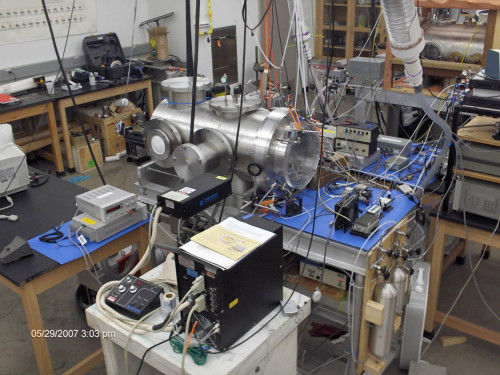Stephen Cooke Receives National Science Foundation Grant and Publishes His 100th Article
The NSF Grant
The team will develop a new, state-of-the-art, rotational microwave spectrometer on the campus of Missouri University of Science and Technology in Rolla, MO. The teams expects the device to take three years to build, beginning this month.
“The instrument will be used by several universities to collect some of the most detailed information available about the structure of gas phase molecules. The new spectrometer is projected to offer improvements in molecular measurements for research in fundamental gas phase physical chemistry and chemical physics,” writes Missouri S&T.
The device’s innovation comes from the addition of multiple antennae, or detection points, which will increase the sensitivity compared to other microwave spectrometers in use today.
Cooke explains what differentiates the spectrometer the team intends to build. “The instrument will be capable of determining molecular structures, that is atom-to-atom distances and chemical bond angles in molecules very accurately. Many other instruments can do this, but we hope that the new instrument will have significantly improved sensitivity, which will allow more unusual and difficult-to-synthesize molecules to be investigated.”
Cooke’s portion of the grant, $103,480, will be used to buy equipment and support student research. The funds will allow Cooke to buy a laser to serve as an important part of the new instrument. “The laser will be involved in producing these difficult-to-synthesize molecules as it is capable of vaporizing and reacting small amounts of involatile materials in a carefully controlled manner.”
Two undergraduate students will receive $5,000 summer stipends to engage in research and additional $2000 each for travel to the Missouri University Science and Technology. The students will also present their work at the International Symposium on Molecular Spectroscopy at the University of Illinois, Urbana-Champaign. The award will support students in the Summers of 2021 and 2022.

The ability to use a spectrometer remotely is relatively unusual and will be a tremendous opportunity for Purchase students, not to mention researchers around the world. “For example, large telescope facilities often allow users to control the telescope remotely,” he explains, however, “In the field of molecular spectroscopy, it is unusual and speaks to how it is hoped that the instrument will potentially prove useful to many researchers across the world without the need to travel.”
One Hundred Publications
The award comes at a significant moment in Cooke’s research career. He recently published his 100th peer reviewed article in the Journal of Molecular Spectroscopy for May-June 2020. One of his co-authors on that paper was former student Wilman Orellana ’16.
All concerning molecular structure, he remembers his first undergraduate paper in 1995. “It was important and ‘career-shaping’ as it really engaged me in the act and art of research in the sciences.”
“Since then I have had the privilege of publishing papers with many undergraduate, graduate students, and colleagues from all over the world. To date I have collaborated with researchers in Canada, Czech Republic, Denmark, France, Germany, Italy, New Zealand, Poland, Portugal, Slovakia, United Kingdom and all over the United States,” he adds.
“I continue to be fascinated by the shapes of molecules and how molecules move and I look forward to continuing my work in this area and sharing my passion with others for many years to come.”